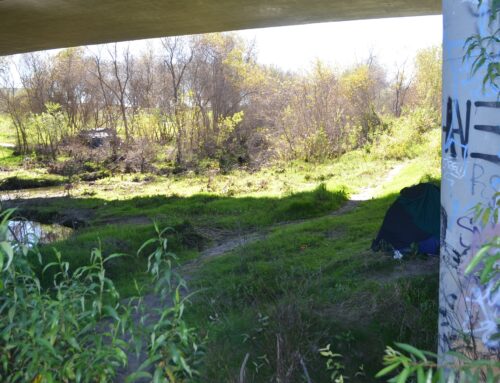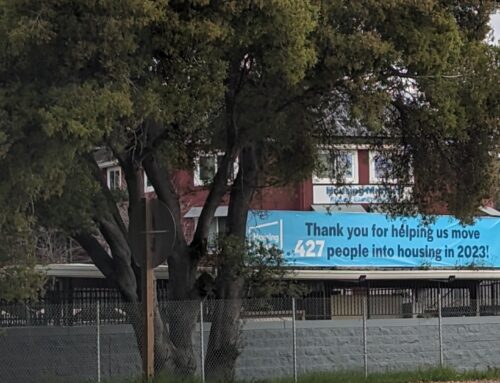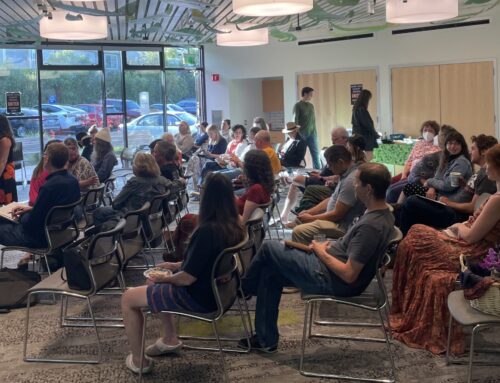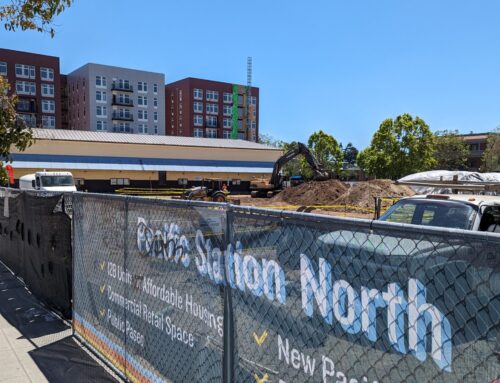Read Santa Cruz Local's Election Guide
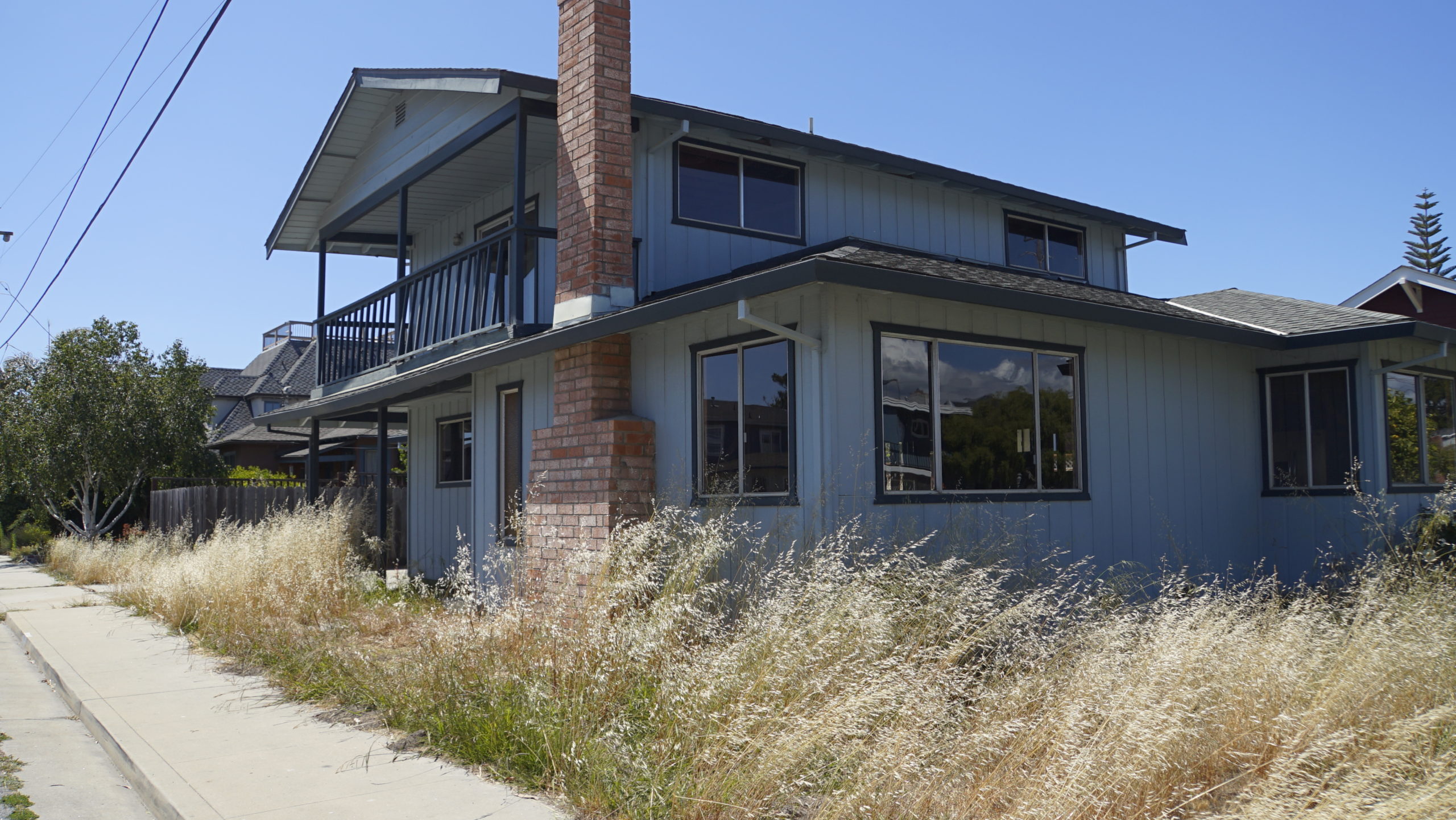
A four-bedroom home near West Cliff Drive in Santa Cruz remains empty in June after its sale for $2.3 million in November 2021. Homes under construction would be exempt from a proposed tax on empty homes. (Kara Meyberg Guzman — Santa Cruz Local)
What is Measure N?
Santa Cruz city voters will decide on Measure N in the Nov. 8 election. Measure N is a tax on homes that are vacant for most of the year in the City of Santa Cruz. The tax would raise money for affordable housing projects. Because of the city’s housing shortage, the tax is intended to incentivize homeowners to occupy or rent their properties. Proponents gathered signatures to put the measure on the Nov. 8 ballot.
Oakland, Washington, D.C., and Vancouver, British Columbia have similar taxes on vacant homes. San Francisco and Berkeley are among the cities where leaders are considering similar measures. The Capitola City Council considered a vacancy tax this year and decided not to include it on the November ballot.
What would Measure N do?
Homeowners in the city would be required to submit an annual form online or by mail that declares whether their home has been occupied for at least 120 days in the past year. The days do not have to be consecutive, and the home can be occupied by the owner or by a tenant, according to the proposed law.
If the parcel has been occupied for fewer than 120 days in the past year, owners would pay a fee of $6,000 per parcel for a single family home. Owners would pay $6,000 per vacant parcel for complexes of up to six units, and pay $3,000 per vacant unit for complexes of seven or more units.
Most of the money raised would fund the construction of new affordable housing projects or help purchase properties to convert to affordable housing.
- The housing must be for residents with low-, very low-, or extremely-low income compared with Santa Cruz County’s area median income.
- Up to 5% of the money could be used for hygiene, sanitation and bathroom services for the homeless.
- Up to 15% of the money could be used to implement the tax.
The city would develop an annual audit process. Those audited would be required to provide evidence that the parcel has been occupied. The number of audits completed and the evidence required isn’t specified in the proposed law. Evidence could include water and electricity bills as well as a driver’s license with the home’s address listed, the measure’s campaign manager has said.
The initiative includes several exemptions from the tax:
- Homeowners who had a major medical event or active military deployment.
- Buildings under active construction.
- Owners waiting for building permit approval or development entitlements from the city.
- The 291 parcels permitted under the city’s Short Term Rental Ordinance.
What does a “yes” vote mean?
Measure N would institute a vacancy tax for houses and apartments within the City of Santa Cruz. The tax would begin in 2024. In 2024, homeowners would have to submit declarations of occupancy for 2023. Money from the tax would be used to fund affordable housing projects.
What does a “no” vote mean?
A “no” vote on Measure N would not add a vacancy tax.
Things to consider about the Empty Home Tax
Proponents and opponents of the proposed tax have argued about the city’s vacancy rates.
City finance leaders have produced an analysis in June and a revised analysis in August that estimated the revenues, startup costs and annual administration costs of the proposed Empty Home Tax program.
In the August report:
- The city’s finance department estimated that 1,000 houses and apartments would be eligible for the tax, based on city records.
- Depending on how many of those homes would qualify for exemptions to the tax, the measure would raise about $2.5 million to $4.1 million each year, the finance department estimated.
- One-time startup costs of about $533,746, down from about $607,000 in the city’s June analysis.
- An annual administration cost of about $450,000, up from about $420,000 in the city’s June analysis.
Leaders of Santa Cruz Together, a political committee, have said they do not support the Empty Home Tax in part because they believe the filing methods are onerous to homeowners and invade homeowner’s privacy. Santa Cruz Together formed in 2018 to successfully oppose Measure M. The measure proposed stricter eviction rules and rent control.
Other opponents of the Empty Home Tax have said it could add a layer of bureaucracy without raising much money to create affordable housing.
If voters adopt the tax, an Empty Home Tax Oversight Committee would “oversee the administration of the tax,” according to an impartial analysis by Santa Cruz City Attorney Tony Condotti. The committee also would make recommendations to the Santa Cruz City Council “for improvement of zoning and land use designations in the interest of creating affordable housing,” Condotti wrote.
Condotti wrote: “The committee would have up to nine members, including three members who must be renters, two low-income individuals, two with financial expertise, one UC Santa Cruz student, and one unionized city employee. The measure would require the city manager or designee to provide clerical assistance, administrative support and technical assistance, and to attend committee meetings.”
Casey Beyer, CEO of the Santa Cruz County Chamber of Commerce, questioned whether the group would be effective.
Beyer said the committee “has no practical experience in the affordable housing sector, and has no implied knowledge of zoning and the land-use decision making process,” Beyer wrote in a statement. “Furthermore, only two members of the nine-member committee have a designated requirement of financial expertise.”
Supporters of the Empty Home Tax have said the tax:
- Will create an incentive for owners of second homes to rent or live in the homes. New rentals would increase the city’s workforce housing stock.
- Home occupants likely would spend more money in Santa Cruz and contribute to the tax base for city services.
- Will create a new money source for affordable housing projects.
- Will not apply to most Santa Cruz city residents.
Similar to other tax law penalties, the Measure N text states that misdemeanors could be prosecuted against homeowners who lie on the form. Homeowners who do not submit affidavits on whether they have occupied a home could be charged with an infraction in the first two instances, then a misdemeanor, according to the proposed law. Those convicted of a misdemeanor could face a fine or jail time, according to the proposed law. As with every law, scofflaws do not necessarily prompt prosecution.
During an Aug. 23 Santa Cruz City Council meeting, Condotti was asked whether the proposed Empty Home Tax would create a public registry of vacant homes. Condotti said, “I’m not familiar with a registry component of the measure. There’s an annual declaration that will be maintained on file by the city in some database, but not to my knowledge a publicly available registry.”
How have similar taxes worked in other places?
In the two years a similar tax has been assessed on empty homes in Oakland, it has raised $14.4 million, an Oakland city spokeswoman said. About $2.2 million was raised from residential properties; the remainder came from vacant units in commercial or mixed-use properties, which would not be taxed under Measure N. The number of residential parcels assessed for the tax fell 3% from 2019 to 2020.
A vacancy tax started in 2017 in Vancouver, British Columbia has raised $105.6 million, according to a Vancouver city report. Vacant properties have decreased by 26%, according to the report.
A key difference in Oakland is that taxes are assessed to units that city officials determine to be vacant. Santa Cruz’s proposed rules would require homeowners to self-identify each year whether their property has been vacant.
More information
- Text of the proposed Empty Home Tax law in the City of Santa Cruz
- June fiscal impact report of the Empty Home Tax by the Santa Cruz Finance Department
- August fiscal impact report of the Empty Home tax by the Santa Cruz Finance Department
- Arguments in favor and against the Empty Home Tax published by the Santa Cruz County Clerk
- Yes on Measure N
- Santa Cruz Together
- Register to vote in Santa Cruz
Santa Cruz Local stories on the Empty Home Tax
- Measures on empty homes, library head to Santa Cruz ballot – June 28, 2022
- Proposed tax on empty homes debated in Santa Cruz – June 17, 2022
Correction: The number of permitted units in Santa Cruz’s Short Term Rental Ordinance was incorrect in an earlier version of this story.
Questions or comments? Email [email protected]. Santa Cruz Local is funded by members, major donors, sponsors and grants for the general support of our newsroom. Our news judgments are made independently and not on the basis of donor support. Learn more about Santa Cruz Local and how it is funded.
Santa Cruz Local’s news is free. We believe that high-quality local news is crucial to democracy. We depend on locals like you to make a meaningful contribution so everyone can access our news. Learn about membership.
Jesse Kathan is a staff reporter for Santa Cruz Local through the California Local News Fellowship. They hold a master's degree in science communications from UC Santa Cruz.


